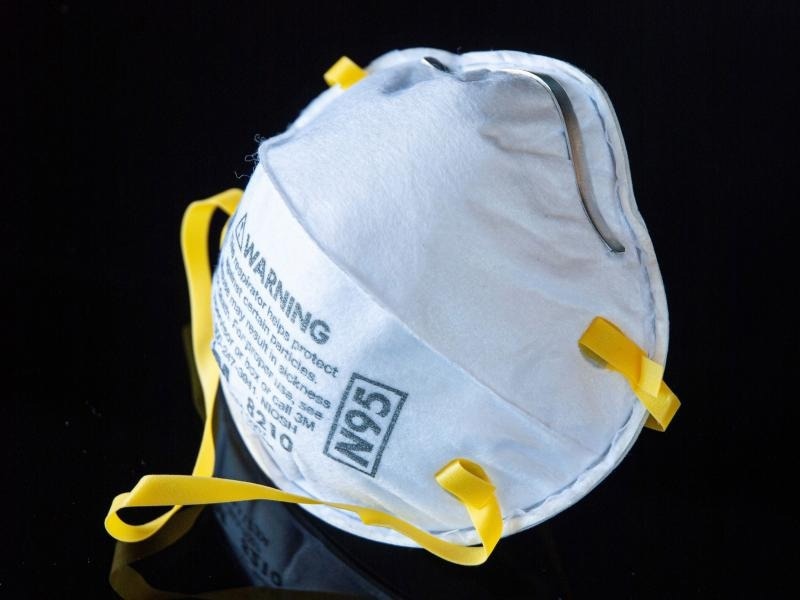Scientists from the Rensselaer Polytechnic Institute have come up with an approachable method to make N95 face masks that are not only efficient barriers to germs but on-contact germ killers.

Image Credit: Rensselaer Polytechnique Institute.
It is possible for the antibacterial and antiviral masks to be worn for a longer period of time than conventional masks, thus generating less plastic waste as the masks do not be replaced often.
Helen Zha, assistant professor of chemical and biological engineering and a member of the Center for Biotechnology and Interdisciplinary Studies at Rensselaer (CBIS), collaborated with Edmund Palermo, associate professor of materials science and engineering and a member of the Center for Materials, Devices, and Integrated Systems (cMDIS) at Rensselaer.
This partnership was established to combat environmental pollution and infectious respiratory disease with the ideal recipe to enhance face masks.
Palermo stated, “This was a multifaceted materials engineering challenge with a great, diverse team of collaborators. We think the work is a first step toward longer-lasting, self-sterilizing personal protective equipment, such as the N95 respirator. It may help reduce transmission of airborne pathogens in general.”
In a newly performed study, the team has been successful in grafting broad-spectrum antimicrobial polymers onto the polypropylene filters that have been utilized in the N95 face masks.
The study has been reported in the Applied ACS Materials and Interfaces journal
The active filtration layers in N95 masks are very sensitive to chemical modification. It can make them perform worse in terms of filtration, so they essentially no longer perform like N95s. They’re made out of polypropylene, which is difficult to chemically modify. Another challenge is that you don't want to disrupt the very fine network of fibers in these masks, which might make them more difficult to breathe through.
Helen Zha, Assistant Professor, Chemical and Biological Engineering, Rensselaer Polytechnique Institute
Zha and Palermo, together with other scientists from Rensselaer, Michigan Technological Institute, and Massachusetts Institute of Technology, covalently fixed antimicrobial quaternary ammonium polymers to the fiber surfaces of nonwoven polypropylene fabrics with the help of ultraviolet (UV)-initiated grafting. The fabrics were gifted by Hills Inc. courtesy of Rensselaer alumnus Tim Robson.
The process that we developed uses a really simple chemistry to create this non-leaching polymer coating that can kill viruses and bacteria by essentially breaking open their outer layer. It’s very straightforward and a potentially scalable method.
Helen Zha, Assistant Professor, Chemical and Biological Engineering, Rensselaer Polytechnique Institute
Only UV light and acetone were utilized by the researchers in their process, which are extensively available, thereby making them simple to implement. In addition, the process could be employed for previously manufactured polypropylene filters, instead of developing new ones.
The researchers did notice a reduction in filtration efficiency while the process was employed directly to the filtration layer of N95 masks. However, the solution is simple.
It is possible for the user to wear an unaltered N95 mask together with one more polypropylene layer along with the antimicrobial polymer on top. In the forthcoming days, manufacturers could create a mask with an antimicrobial polymer that has been integrated into the top layer.
As a result of the National Science Foundation Rapid Response Research (RAPID) grant, Zha and Palermo began their research in 2020 at a time when N95 face masks were in great shortage, and healthcare workers were reusing masks that were only meant to be single-use.
Fast forward to 2022 and face masks of all types are currently available in an extensive manner. But COVID rates are still high and the threat of another pandemic in the future is a possibility, and single-use, disposable masks are accumulating in landfills.
Hopefully, we are on the other side of the COVID pandemic. But this kind of technology will be increasingly important. The threat of diseases caused by airborne microbes is not going away. It’s about time that we improved the performance and sustainability of the materials that we use to protect ourselves.
Helen Zha, Assistant Professor, Chemical and Biological Engineering, Rensselaer Polytechnique Institute
“Attaching chemical groups that kill viruses or bacteria on contact to polypropylene is a smart strategy. Given the abundance of polypropylene in daily life, perhaps this strategy is useful in many other contexts, as well,” stated Shekhar Garde, Dean of the School of Engineering at Rensselaer.
At Rensselaer, Zha and Palermo collaborated on the study with Mirco Sorci, Tanner D. Fink, Ruiwen Chen, Katharine Dovidenko, and former Rensselaer researcher Brigitte L. Arduini. Vaishali Sharma, Sneha Singh, and Caryn L. Heldt contributed from Michigan Technological University.
The study was performed with assistance from the National Science Foundation.
Journal Reference:
Sorci, M., et al. (2022) Virucidal N95 Respirator Face Masks via Ultrathin Surface-Grafted Quaternary Ammonium Polymer Coatings. ACS Applied Materials Interfaces. doi.org/10.1021/acsami.2c04165.